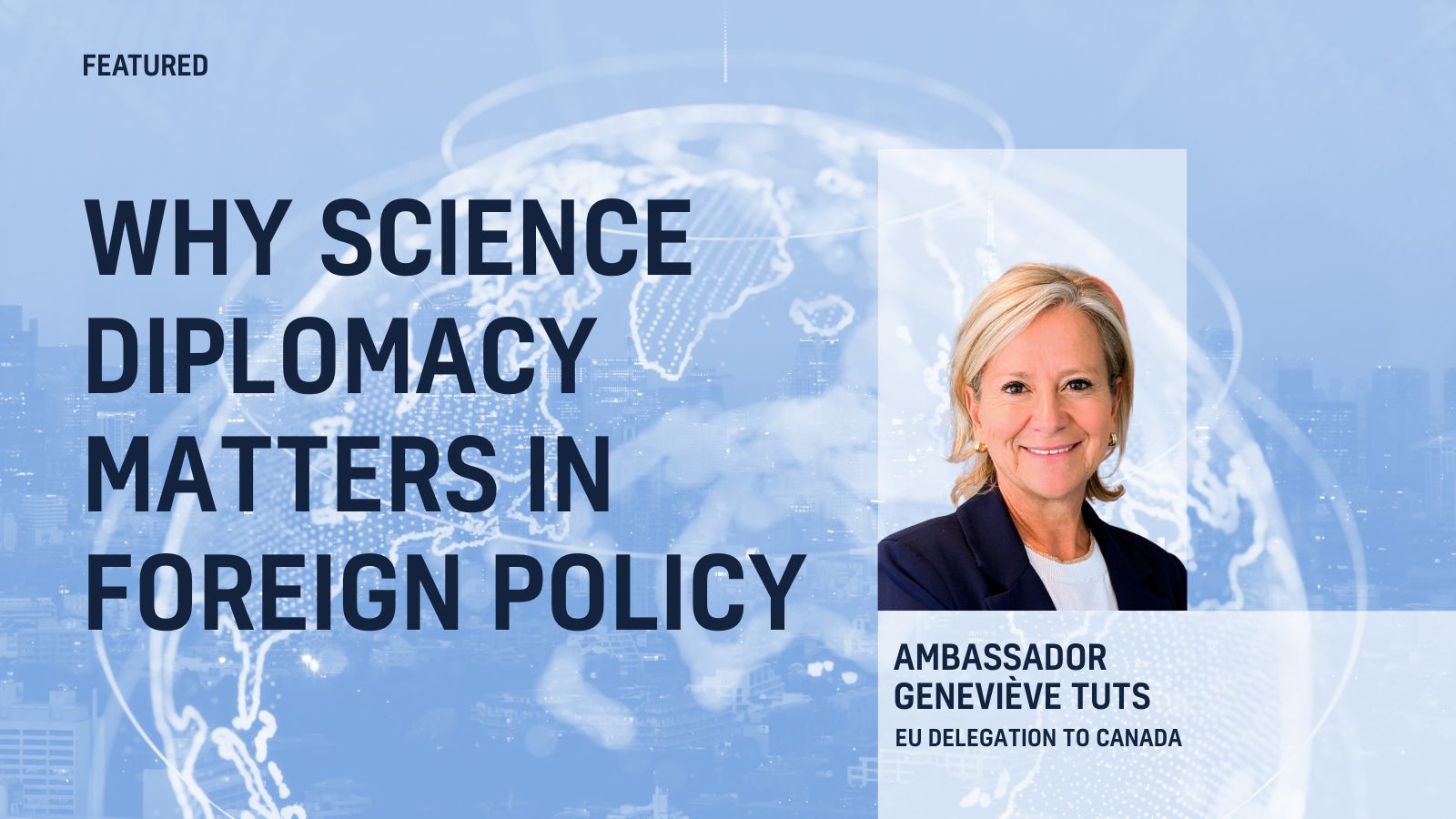Why science diplomacy matters in foreign policy

Author(s):
Geneviève Tuts
EU Delegation to Canada
Ambassador
Disclaimer: The French version of this text has been auto-translated and has not been approved by the author.
Europe’s competitiveness and industrial leadership begin with science. We are in an age of geostrategic rivalries, an age where science and technology breakthroughs shape the global economy, leading to both cooperation and competition among nations.
Ground-breaking developments in areas such as artificial intelligence, quantum computing and biotechnologies have brought the role of research and innovation to the forefront. Technological advancements have become a geopolitical currency with the power to wield influence.
Like Canada, Europe finds itself at a crossroads faced with three major challenges: closing the innovation gap with the U.S. and China, particularly in advanced technologies, decarbonising the economy while boosting competitiveness, and increasing security by reducing industrial dependencies.
In the unstable times we live in, one thing still remains certain: Science holds the key to these pressing challenges.
By placing research and innovation at the core of European competitiveness, the European Union (EU) is also putting research and innovation at the heart of our foreign and security policies.
As European Commission President Ursula von der Leyen mentioned on 10 September in front of the European Parliament during the annual State of the Union address: “This must be Europe’s Independence Moment. I believe this is our Union’s mission. To be open to the world and choose partnerships with allies – old and new.”
Through the universal language of science, we strive to keep the dialogue open with nations around the world, while promoting the core values and principles the European Union stands for: multilateralism, free and fair trade, open societies, the rule of law and respect for human rights.
The European Union is seeking to develop a European Framework for Science Diplomacy, building on decades of scientific knowledge and progress through the EU Research and Innovation Framework Programmes. A recent report, based on recommendations from 130 European experts across the science and diplomacy communities, concludes that such an ambitious framework for science diplomacy will enable the European Union to defend its strategic interests and reduce its vulnerabilities, while, at the same time, promoting our values and serving the public good worldwide.
Horizon Europe – the European Union’s key funding programme for research and innovation – is a case in point. With a budget of €93.5 billion or CAD $151.56 billion (2021-2027), the programme funds crucial research and innovation in critical areas, including health, aerospace, energy, bioeconomy, artificial intelligence, cybersecurity and digital infrastructure, to name a few. It is open to the world, including through the association of like-minded partners outside the EU. And as such, it is the European Union’s most powerful tool of science diplomacy.
Since July 2024, Canada has become an associated country to Pillar 2 of Horizon Europe, which funds collaborative research projects to tackle global challenges and boost competitiveness. In the short time since then, Canadian and European researchers and innovators have wasted no time in getting a number of research projects off the ground and turning the association into a success.
Among the success stories, there is the €4.1 million or CAD $6.6 million DEFENSEFOOD project with several participating universities, including McGill University in Montreal, which aims to enhance the resilience of the food supply chain against chemical, biological, and radiological threats, as well as the €7.5 million or CAD $12.1 million BLOOM project focusing on the extraction and processing technologies for critical raw materials. The latter features a consortium of 15 partners from EU countries, Ukraine, Canada and Brazil.
Another notable example of Canadian involvement is the new PHARES project in the field of clean air travel. A Canadian company will coordinate a funding envelope of €69 million or CAD $111.9 million to advance research on hybrid-electric propulsion for regional aviation, working together with EU partners.
Undoubtedly, science diplomacy is a powerful tool in international relations. The European Union played a leading role together with other partners in launching an International Coalition for Science, Research, and Innovation in Ukraine during the 2025 Ukraine Recovery Conference that took place in Rome last July. The Coalition aims to support Ukrainian scientists, drive reconstruction, and reinforce the role of research and innovation in the country’s recovery. Membership in the Coalition is open to governments, international organisations, research entities, academic institutions, foundations, development banks, and private sector actors actively supporting Ukraine’s research sector. Strategic partners like Canada are welcome to contribute to this collaborative recovery effort.
As science diplomacy emerges as a distinct part of both the European Union’s and our Member States’ foreign policies, we send a clear message to our partners and competitors that we will continue to be a beacon of reason, tolerance and scientific evidence in a tumultuous world.
The European Union and its Member States are acting together in this effort, in the true spirit of “Team Europe.”

